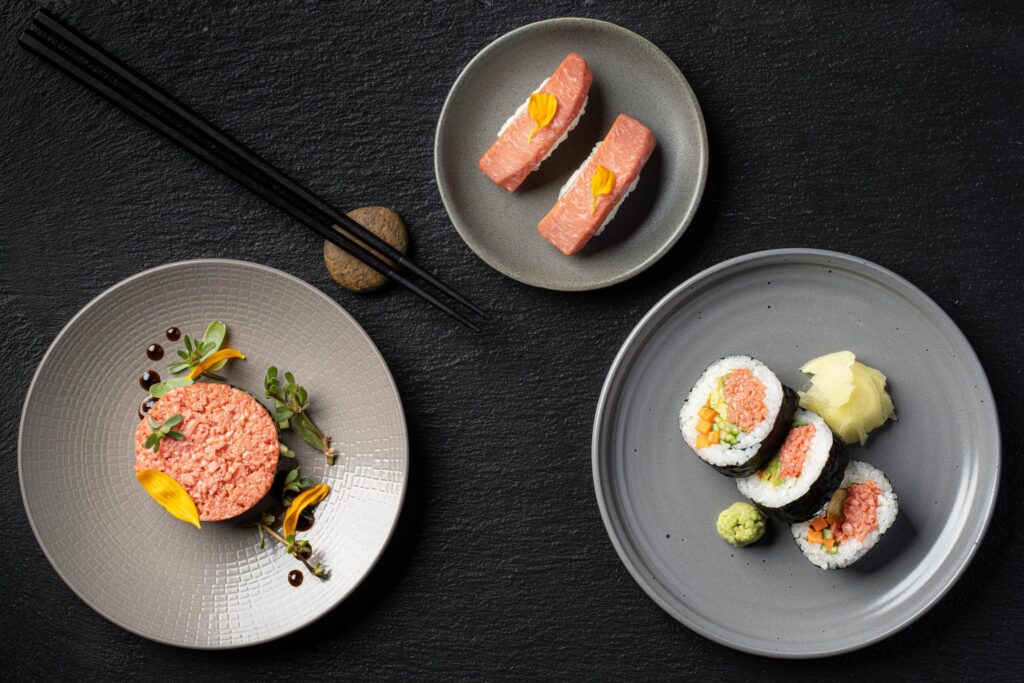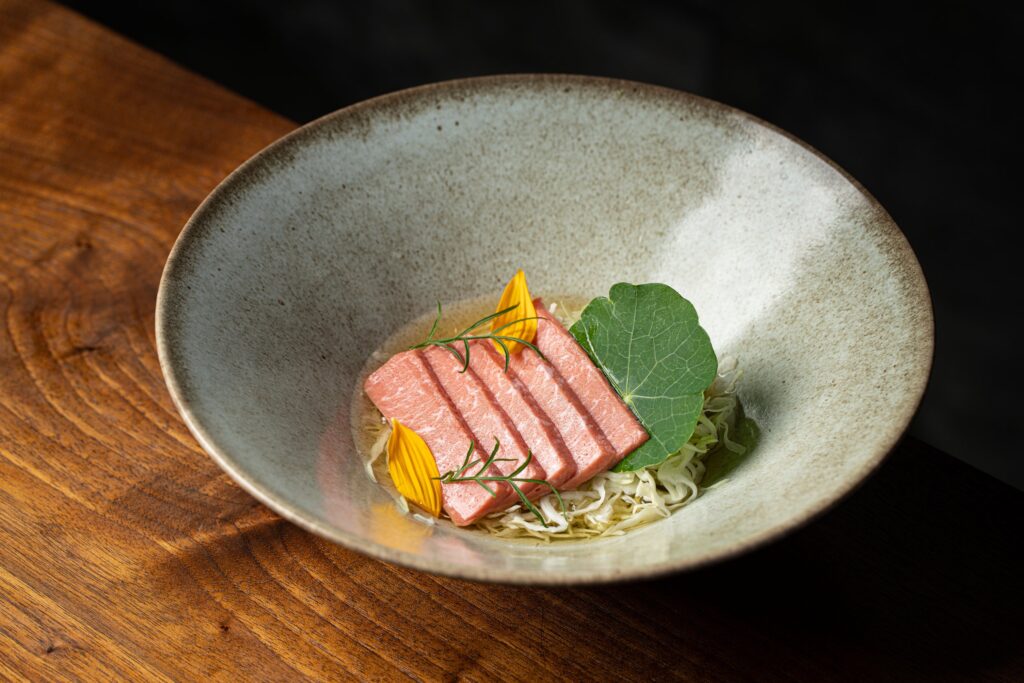
US cultivated seafood startup BlueNalu is targeting an initial launch of its bluefin tuna in California and has cemented partnerships to take the product global.
A highly prized sushi delicacy made from cultured tuna cells could soon be coming to diners’ plates in California.
San Diego-based BlueNalu is targeting the state as the first port of entry for its cultivated bluefin tuna toro, having filed for regulatory approval with the US Food and Drug Administration (FDA) and Department of Agriculture (USDA).
“Our initial launch will focus on California, starting in our home base of San Diego – a region known for its vibrant food culture and consumers who prioritise healthy and responsibly produced products,” founder and CEO Lou Cooperhouse tells Green Queen.
At the same time, the company is laying the groundwork for international operations in “markets where demand, regulatory clarity, and strategic partnerships align”. That includes Singapore (where it has submitted a regulatory dossier), the UK (where it’s part of the government’s new regulatory sandbox scheme), and several nations in Asia-Pacific and the Middle East.
The UK is the only European country to have approved cultivated meat for sale, which has prompted BlueNalu to amp up its focus on this market and expand its ongoing partnership with frozen food distributor Nomad Foods.
“We began collaborating in 2021 to explore the market potential for cultivated seafood and following compelling consumer insights, we are now working together on market entry and commercialisation strategies,” says Cooperhouse, noting that the link-up will help bring its cultivated tuna to both the UK and the wider European market.
“This includes evaluating premium foodservice offerings that align with consumer demand for high-quality, sustainable seafood, and also exploring other channels of distribution that align with Nomad’s current and future capabilities,” he adds.
Brits respond positively to cultivated seafood

As part of its global push, BlueNalu commissioned a survey of 2,000 frequent sushi consumers in the UK last summer. “The results showed strong enthusiasm for BlueNalu’s first product, cell-cultivated bluefin tuna toro: 92% of respondents expressed some level of interest in trying it, including 55% who were very or extremely interested,” reveals Cooperhouse.
“Consumers identified the absence of parasites, pesticides, microplastics, mercury, and antibiotics as top benefits, followed by high omega-3 content and sustainable production,” he adds. “The study also affirmed that the terms ‘cell-cultivated’ and ‘cell-cultured’ effectively communicate the product’s origin and align with consumer expectations.”
BlueNalu is one of eight startups participating in the UK Food Standards Agency’s (FSA) two-year regulatory sandbox programme, which aims to help firms bring cultivated meat to market faster. It is the only US company in the scheme, and the only one focused on seafood.
BlueNalu CTO Lauran Madden calls it a “first-of-its-kind initiative” designed to support the development of safe and innovative cultivated food products. “The sandbox offers a unique opportunity for early, collaborative engagement with regulators to ensure we are aligned with the FSA’s expectations and data requirements for novel food applications, and structured dialogue and feedback,” she tells Green Queen.
“We commend the FSA for its forward-thinking approach and leadership in enabling a science-based, transparent regulatory pathway for emerging food technologies,” Madden adds.
In the aforementioned survey, 73% of Brits said they’d likely visit a sushi restaurant that offers the product. So it stands to reason that BlueNalu is planning to introduce its tuna in the UK and Europe through premium sushi and fine-dining restaurants.
“This approach reflects both consumer interest and our product’s unique value proposition. Nomad Foods has a long history of launching innovative seafood products, and together we are identifying the best entry points that meet today’s expectations for taste, safety, consistency, and sustainability,” says Cooperhouse.
“As we progress towards commercialisation, this partnership enables us to pair scientific and regulatory progress with real market insights and commercial expertise.”
The cost economics of bluefin tuna

Bluefin tuna is a highly sought-after seafood delicacy, thanks to its velvety texture, buttery flavour and nutritional attributes. However, this species represents the ocean’s fastest and longest-distance swimmers, which makes it difficult to raise the fish in captivity, thus commanding a higher price. Toro is the fatty part of bluefin tuna belly, and is used in high-grade sushi and sashimi.
However, its supply is limited and extremely variable in quality, and its stocks face declines due to overfishing and illegal, unregulated and unreported fishing. Continued demand is driving the species towards endangerment and has prompted governments to place strict quotas to limit its fishing. Plus, tuna is one of the most polluted fish in the oceans, often contaminated with plastic debris and extremely high levels of heavy metals like mercury.
Israel’s Wanda Fish, too, is working on cultivated bluefin tuna toro to address this issue, though BlueNalu appears to be ahead in the race to bring it to consumer plates. It already operates a 38,000 sq ft pilot plant in San Diego (which can produce enough tuna for small-scale sales), and has unveiled plans for a larger 140,000 sq ft facility that can manufacture six million lbs of product annually once operational.
This will help bring down costs for the cultivated tuna, a crucial aspect for most consumers. That said, the company is already staring at an advantage here, since bluefin tuna toro already carries a premium price tag, so a cell-cultured version wouldn’t have the same cost difference as that with commodity beef or chicken. According to the poll, 74% of UK consumers are willing to pay the same or more than for conventional bluefin tuna.
“BlueNalu’s business strategy centres on high-demand species that address challenges in supply, consistency, sustainability, and food security – particularly those that displace imports… and command premium pricing,” says Cooperhouse.
“Seafood is already a premium category, and toro is one of the most expensive cuts, and has been described as the ‘Wagyu beef of the sea’. That gives us a unique opportunity to compete in a segment where consumers already expect to pay for quality, and where BlueNalu’s product’s health benefits, consistency, and safety attributes add real value.
“BlueNalu’s consumer research has already demonstrated that many consumers will see great value in our products, due to the health and safety advantages associated with our process. As a result, we believe we will be able to sell our products at or near price parity from our early stages of commercialisation.”
BlueNalu attracting global interest

The results of the UK research are “highly consistent” with other consumer studies BlueNalue has conducted in the US, Japan, South Korea, Singapore, Thailand, Saudi Arabia, and the UAE, covering nearly 10,000 people who “showed broad demand” for its seafood.
“Across these markets, we’ve seen strong interest in cell-cultivated seafood, especially among health-conscious consumers who value safety, quality, and transparency,” says Cooperhouse.
BlueNalu has previously announced partnerships and agreements with Asian food giants Pulmuone (South Korea), Mitsubishi, Sumitomo (both Japan), and Thai Union (Thailand), as well as industry leaders like Rich Foods and Griffith Foods. In addition, it has teamed up with Neom, Saudi Arabia’s upcoming future-facing city.
It is one of the most well-funded startups in the cultivated meat industry, having attracted $118M over several rounds, including a $33.5M Series B raise in 2023. However, the firm was an outlier that year, when overall funding for cultivated meat dropped by 75%.
That fall has since continued, as legislative challenges in the US and overseas have attempted to ban cultivated meat (with several states being successful), with investment in this space dropping by a further 40% in 2024.
“As a pre-revenue startup, we’re continually exploring strategic investment opportunities to support our growth,” Cooperhouse says when asked if BlueNalu is seeking new capital.
He adds: “We remain focused on scaling production, advancing regulatory clearances, and building a strong foundation for commercialisation and global market penetration.”
The post California’s BlueNalu Bets on Premium Sushi & Price Parity with Cultivated Bluefin Toro appeared first on Green Queen.
This post was originally published on Green Queen.